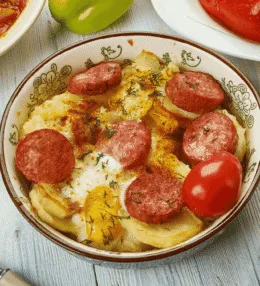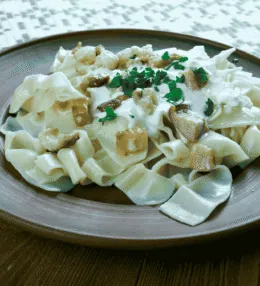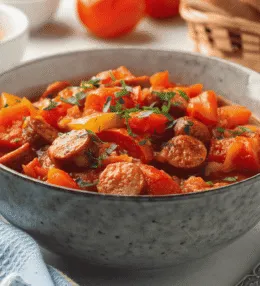
- View
Table of Contents
ToggleMontucas, a cherished dish in Honduran cuisine, these corn tamales are a beloved comfort food, often enjoyed at family gatherings, celebrations, or even as a hearty meal during the week.
Wrapped in banana leaves and filled with savoury goodness, Montucas offer a delightful combination of flavours and textures that reflect the heart of Honduran cooking. With every bite, you experience a connection to the land, the culture, and the deep rooted traditions of this Central American nation.
Want to dive deeper into Honduran Cuisine? Don’t miss our post on 15 Traditional Honduran Foods to Try
What Are Montucas?
Montucas are a type of tamale, a dish common across Latin America but uniquely crafted in Honduras to suit local ingredients and preferences. They are made by preparing a masa (dough) from corn, which is then filled with a variety of ingredients such as seasoned meats, vegetables, or cheese.
The filled masa is carefully wrapped in banana leaves, creating a neat parcel that is steamed until tender. What sets Montucas apart is the use of fresh, locally grown corn, which gives the masa a distinct flavour and texture.
Unlike the dry masa harina used in other tamales, the fresh corn masa in Montucas lends a natural sweetness and moisture, making each bite tender and flavourful.
These tamales are a culinary staple in Honduras, enjoyed as a main dish or a filling snack, and are often paired with sides like sour cream, pickled onions, or a sprinkle of fresh cheese.
Ingredients and Taste
The foundation of Montucas is the masa, which is prepared by grinding fresh corn into a smooth, slightly sticky dough. This masa is often lightly seasoned with salt or a touch of lard to enhance its flavour.
The filling is where creativity shines, with popular options including shredded chicken or pork cooked with tomatoes, onions, bell peppers, and a hint of garlic. Some variations include cheese, beans, or even a simple vegetable medley for a lighter version.
The banana leaves used to wrap the tamales not only hold everything together but also infuse the Montucas with a subtle earthy aroma during steaming.
Once cooked, the tamales are soft and slightly sweet, with the rich filling complementing the corn’s natural flavours. The result is a dish that’s both hearty and comforting, with a balance of savoury and subtly sweet notes.
A Taste of History
Montucas carry a deep cultural significance in Honduras, with their roots tracing back to the indigenous peoples of Mesoamerica who cultivated corn as a staple crop.
The tradition of making tamales dates back thousands of years, evolving over time as different cultures introduced their own techniques and ingredients.
In Honduras, the practice of preparing Montucas is often a family affair, bringing loved ones together in the kitchen to grind corn, prepare fillings, and fold the banana leaf packages. The dish also speaks to the influence of local agriculture and the importance of corn in Honduran cuisine.
By using fresh, locally sourced ingredients, Montucas highlight the connection between the people and the land. Today, they are not just a meal but a celebration of heritage, enjoyed during holidays, festivals, and everyday gatherings.

Honduran Montucas (Corn Tamale)
Equipment
- Large mixing bowl
- Skillet
- Steaming pot with rack or insert
- Banana leaves
- Knife and cutting board
- Kitchen twine or banana leaf strips
Ingredients
For the Masa (Dough):
- 2 cups masa harina corn flour
- 1½ cups chicken or vegetable stock warm
- ¼ cup lard or vegetable shortening
- 1 tsp baking powder
- ½ tsp salt
For the Filling:
- 1 cup cooked shredded chicken (or pork, optional)
- ½ cup diced potatoes cooked until tender
- ½ cup diced carrots cooked until tender
- ½ cup cooked red beans
- ½ cup tomato sauce
- 1 clove garlic minced
- 1 small onion finely chopped
- 1 tsp cumin
- 1 tsp paprika
- Salt and pepper to taste
- 8-10 fresh banana leaves cleaned and cut into 12-inch squares
For Assembly:
- ½ cup sour cream optional, for serving
Instructions
- Prepare the masa by combining masa harina, baking powder, and salt in a large bowl. Gradually add the warm stock while kneading the dough until it reaches a soft, pliable consistency. Add the lard or shortening and knead until fully incorporated. Cover the masa with a damp cloth to prevent it from drying out.
- Prepare the filling. In a skillet, heat a little oil over medium heat. Sauté the onions and garlic until fragrant. Add the shredded chicken, cooked vegetables, and beans. Stir in the tomato sauce, cumin, and paprika. Season with salt and pepper. Let the mixture simmer for 5-7 minutes, stirring occasionally. Remove from heat and let it cool.
- Prepare the banana leaves by lightly passing them over an open flame or dry skillet for a few seconds on each side to make them pliable. This prevents them from cracking during assembly.
- To assemble the Montucas, place a banana leaf square on a flat surface. Scoop about 3 tablespoons of masa onto the centre of the leaf and spread it into a rectangle. Add 2 tablespoons of the filling on top.
- Fold the banana leaf around the masa and filling. Start by folding the sides inward, then fold the top and bottom to form a secure package. Tie the Montuca with kitchen twine or a strip of banana leaf. Repeat for the remaining dough and filling.
- In a large pot, bring water to a boil with a steaming rack or insert. Arrange the Montucas upright in the steamer, ensuring they do not touch the boiling water. Cover and steam over medium heat for 1 to 1½ hours, checking periodically to add more water if needed.
- After steaming, check one Montuca to ensure the masa is firm and fully cooked. If not, steam for an additional 10-15 minutes.
- Remove the Montucas from the steamer and let them rest for 5 minutes before unwrapping.
- Serve the Montucas warm with a dollop of sour cream or your favourite hot sauce. For a traditional touch, pair them with a side of fresh Honduran pickled vegetables.
Nutrition
You May Also Like










